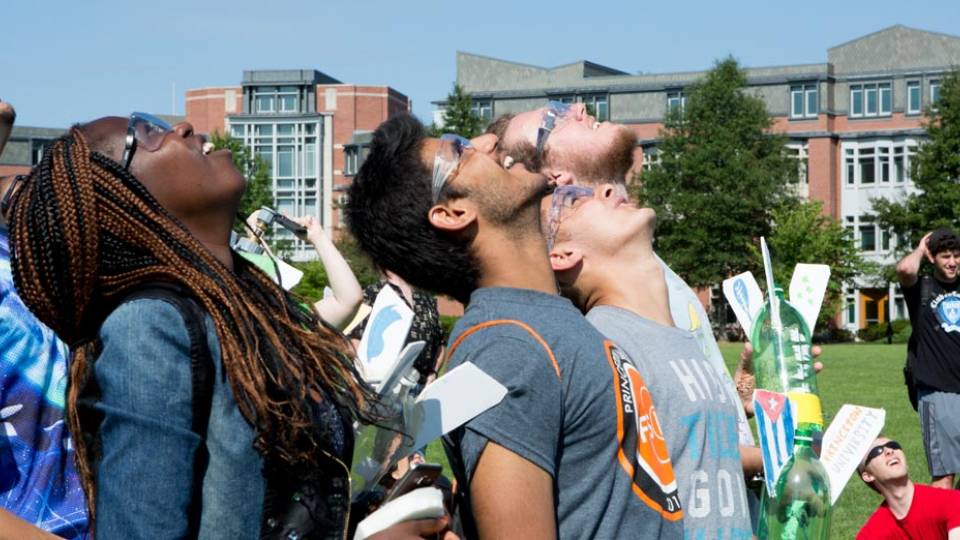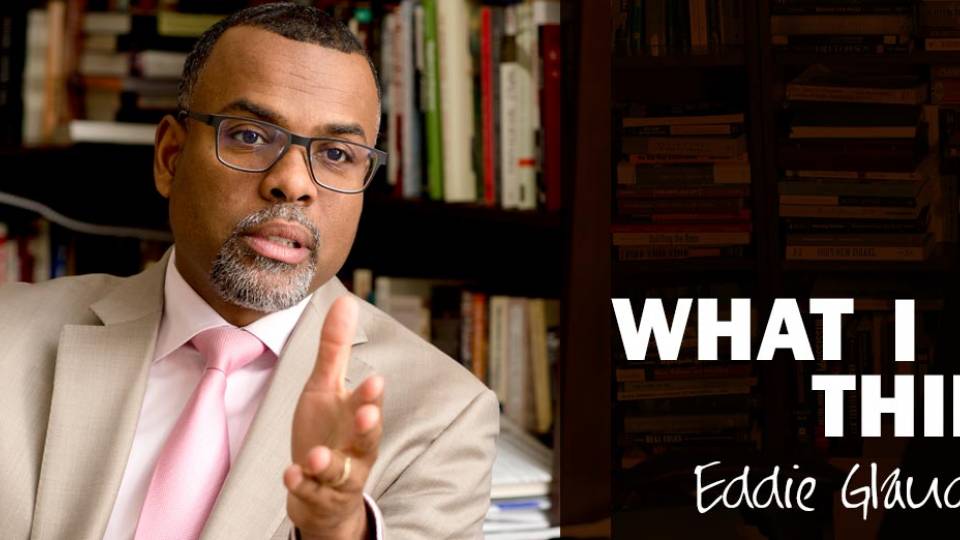Princeton faculty and students work out their energy through freestyle movements during the Lewis Center for the Arts dance class “Uncertainty” taught by Aynsley Vandenbroucke. English, religion and chemistry faculty joined the class on March 5 as part of Princeton Teaching Week, which opened select classes and athletic practices to observation by faculty and staff.
Princeton professors are known for their passion for teaching. Ask students what makes a Princeton education special and they’ll often say the chance to learn from faculty who are both leaders in their fields and mentors on campus.
"Our faculty are deeply engaged with both research and teaching,” said Dean of the Faculty Sanjeev Kulkarni, the William R. Kenan, Jr., Professor of Electrical Engineering. “One of the attributes that I think makes Princeton unique is that we are a research powerhouse with the feel of a small liberal arts college.”
The University highlighted this commitment to undergraduate education during the first Princeton Teaching Week on March 1-7. Organized by the McGraw Center for Teaching and Learning, the event featured discussions and workshops on innovations, teaching demonstrations, and open classrooms and athletic practices to observe teaching in action.
“One of the privileges of working at the McGraw Center is the opportunity to see all of the thoughtful, creative and inspiring teaching that happens in classrooms across campus,” said Rebecca Graves-Bayazitoglu, associate dean of the college and director of the McGraw Center. “Princeton Teaching Week is our attempt to make our institution's dedication to exceptional teaching more visible by opening up classrooms and athletic practices, and by highlighting some of the curricular and classroom innovations that have taken place in recent years.”

Princeton Teaching Week, held March 1-7, fostered conversation about teaching approaches and innovations among faculty in different departments and programs. The event was organized by the McGraw Center for Teaching and Learning. (From left to right) McGraw Center Director Rebecca Graves-Bayazitoglu moderates a panel on “Making and Remaking the Discipline” with Asif Ghazanfar, professor of psychology and the Princeton Neuroscience Institute; Eddie Glaude, chair of the Department of African American Studies, the James S. McDonnell Distinguished University Professor and professor of religion; and Andrew Houck, professor of electrical engineering.
Co-organizer Katherine Stanton said Princeton Teaching Week allowed faculty, graduate students and staff to observe colleagues and reflect on different approaches to teaching. Open courses included “An Introduction to the History of Architecture,” “Race is Socially Constructed: Now What?,” “Aircraft Design” and “Spanish in the Community.”
“Undergraduate students, of course, are always in class. But it’s rare for professors to sit in on other classes, particularly classes outside of their departments,” said Stanton, the McGraw Center’s senior associate director for teaching initiatives and programs for faculty.
Stanton added: “In a sense, you could say every week at Princeton is teaching week. The event is about calling attention to the great care and focus that Princeton teachers, whether they are professors, coaches or other instructors, give to undergraduates every day.”
In the freshman seminar “The Art and Science of Motorcycle Design,” an engineering librarian, a leader at the Princeton Plasma Physics Laboratory and a residential college director of studies sat with 16 undergraduates as they discussed the book “Zen and the Art of Motorcycle Maintenance” and shared updates from their lab work restoring a vintage motorcycle.
In the dance class “Uncertainty,” observers were welcomed to participate. Faculty from English, chemistry and religion stretched and moved alongside students in the Arts Tower studio.
“Our goal was to foster rich conversations about teaching approaches and innovations with faculty across academic departments and programs,” Stanton said. “Several faculty and staff said they now realize they could ask colleagues to sit in on a class anytime. I see that as a real accomplishment — the practice of observing and sharing will continue.”
During a panel discussion on “Making and Remaking the Discipline,” faculty from African American studies, engineering and neuroscience shared best practices for reimagining curricula. Eddie Glaude, chair of the Department of African American Studies, discussed the process of expanding from a center to a department.
“We had an idea of a department in mind, and we ended up building an intellectual cohort,” said Glaude, the James S. McDonnell Distinguished University Professor and professor of religion. “I am around a bunch of master teachers. All of these folks are amazing teachers in the classroom and amazing scholars as well. If you look at who is being cited, who is having impact on their respective areas, all of us [in the department] are leading the way.”

Chris Sailer (center), head coach of Princeton women’s lacrosse, gathers the team during practice on March 5. It was one of the athletic practices open to observers during Princeton Teaching Week. “Teaching Week is about calling attention to the great care and focus that Princeton teachers, whether they are professors, coaches or other instructors, give to undergraduates every day,” said Katherine Stanton of the McGraw Center.
Professor of Electrical Engineering Andrew Houck talked about developing the School of Engineering and Applied Science’s new sequence of courses for first-year students, which teach math and physics with a greater emphasis on problem-solving for modern engineering challenges. The new curriculum has boosted retention of first-year engineers, including students from backgrounds underrepresented in the field.
First-years may arrive at Princeton with different levels of preparation from high school, but preparation does not equal ability, Houck said.
“Students need to really understand in a very deep way that they belong here and can be successful,” he said. “I believe any student at the School of Engineering can be successful and we can find a way to teach them. And we can do it in a way without watering down the courses.”
During another panel, faculty shared ways to break down the walls of the classroom through experiential and service learning. Rachael DeLue, the Christopher Binyon Sarofim '86 Professor in American Art, said it took years to develop the new course “Battle Lab: The Battle of Princeton” with her colleague Nathan Arrington, associate professor of art and archaeology.
“We tend to think that in order to produce a transformative experience we have to send students far away, but the Princeton Battlefield is just down the road,” she said. “Being in the field, doing hands-on work and getting dirty, made students, in a sense, feel that they were not ‘learning’ in the traditional way. Even though in our minds, they were learning more than we could possibly teach them if we were just lecturing in a classroom.”
DeLue said the class was also transformative for her.
“I’ve always been sort of experimental in the way I teach, but never so much as I have after the Battle Lab class,” she said. “I ask students to do more hands-on exercises in my other courses. I find I’m automatically incorporating more hands-on exercises than in the past.”

Professor of Mechanical and Aerospace Engineering Michael Littman (in blue shirt) leads a discussion during his freshman seminar “The Art and Science of Motorcycle Design.” The class was open to observers during Princeton Teaching Week, which also featured workshops on innovations and discussions on experiential learning.
Princeton Teaching Week also included: a teaching demonstration and reflection with Provost Deborah Prentice, the Alexander Stewart 1886 Professor of Psychology and Public Affairs, and Casey Lew-Williams, assistant professor of psychology; a session on the pedagogy of podcasting with Dan Claro, manager of the Digital Learning Lab; and an interactive workshop on “small” teaching innovations led by Stanton.
Princeton Teaching Week is sponsored by the McGraw Center for Teaching and Learning, which is a unit within the Office of the Dean of the College.






